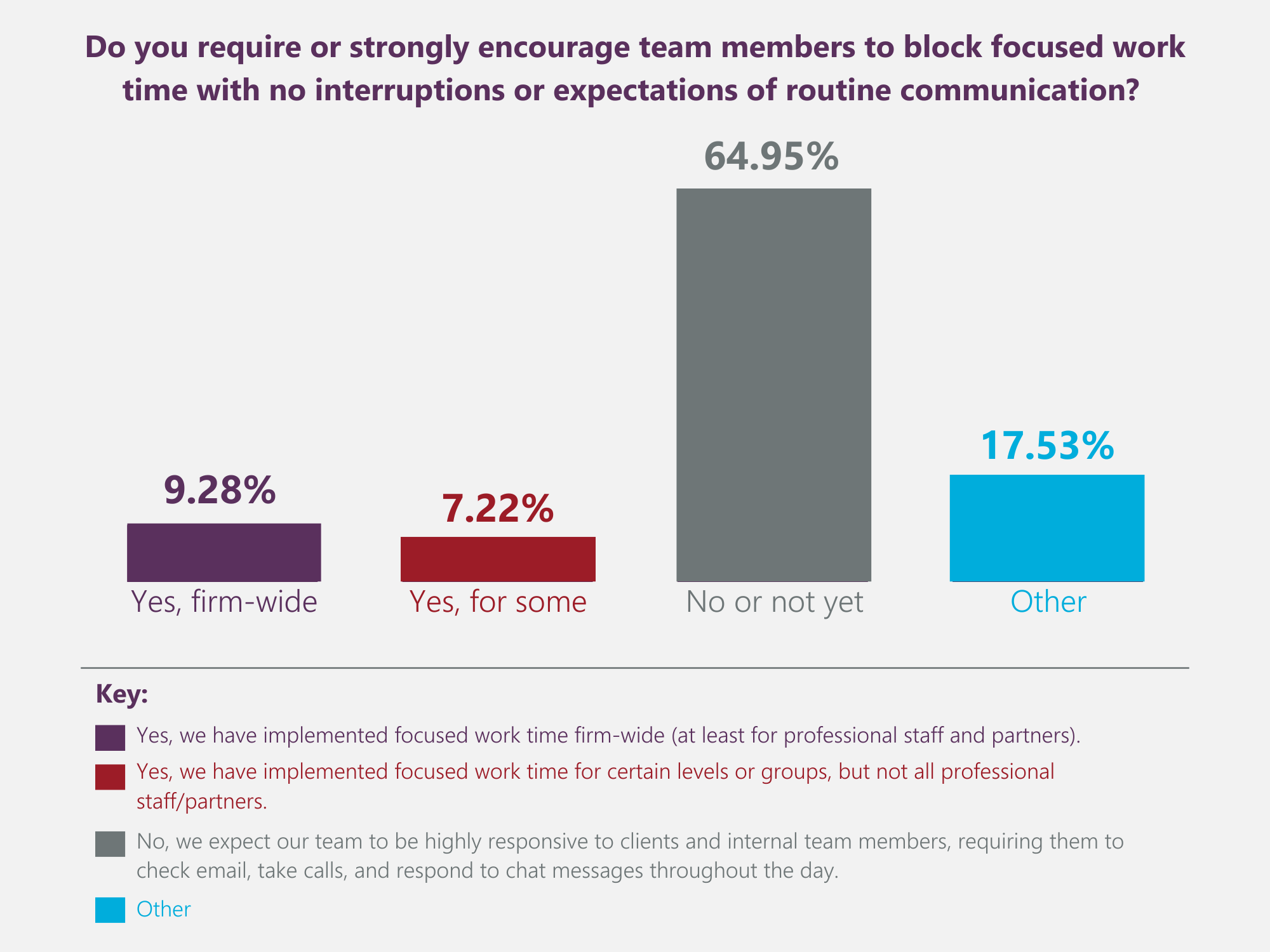Distractions Spar with Productivity (and Poll Results)
![]() Kristen Rampe, CPA / Aug 1, 2023
Kristen Rampe, CPA / Aug 1, 2023
Responding to clients versus protecting yourself from distractions: is it possible to have your cake and eat it too? Increasing productivity can contribute strongly to profitability, and we know that responsiveness is a cornerstone of the accounting profession, something our clients (internal and external) expect.
Most professionals are bogged down with requests for their time. Between emails, chat messages, texts, scheduled meetings, unscheduled meetings, LinkedIn messages, Twitter/X feeds, and countless other social media draws, it’s easy to feel perpetually overwhelmed.
When clients and leaders get in touch, a professional’s job is to respond ASAP. At least, that’s often the norm. But this “always available” culture has its downsides. You’ve heard that fragmentation of work (frequently switching your concentration) is not a great idea. But how is it possible to resist when clients expect a reply to their email without delay?
Enter Focused Work Time
Before the barrage of email (think mid- to late-1990s), distractions were limited to what other humans in your office could inflict, and daily delivery of physical mail. Today, people can get in touch in a dozen different ways at any moment.
At the AICPA ENGAGE conference, I facilitated a discussion where leaders shared various focused-work time practices helpful at their firms. These practices included designating specific blocks of time for focus on client engagement work (or other important projects) – time during which team members are asked not check email, chat messages, and the like. Often the timeframes were two to four hours, after which incoming messages would be attended to.
It may seem like micro-managing to ask—or even require—professionals to set aside time to focus on work uninterrupted, but we believe the upside is worth considering. Imagine finally getting a few bigger projects off your to-do list. Imagine a staff work product that wasn’t rushed through once again.
The opposite end of this spectrum, which we’ve also seen in practice, is firms with such a sense of urgency that professionals fail to meet unspoken expectations if they don’t reply to a colleague or client’s message within 30–45 minutes, even if the “policy” is a one-day response time. This is a prime example of a fractured workday—professionals prioritizing immediate communication over the need to spend concentrated time on, say, a client’s thorny technical issue.
But What About Responsiveness?
Accounting professionals at all levels are prized for their responsiveness. It’s what clients rely on when they’re not sure how to navigate a financial or tax situation. Responsiveness is part of the value they expect when hiring you as a trusted advisor, in addition to their accountant.
Most clients can be trained to accept anything from a four-hour to 24-hour response time. And, while a four-hour response time is very different than four minutes, it can also be the difference between scattered attention and quality work.
If you’re one of many CPAs looking closely at your client list with the intention of culling the less-than-ideal members, perhaps level of neediness related to communication response times could be an evaluation factor.
Are CPA Firms Trying This?
We polled our audience of CPA firm partners to learn how firms balance the need for responsiveness with the need for professionals to focus on important client work without frequent distractions. We received 97 poll responses, and below are the key insights and takeaways.
The concept of focused work time is relatively new to our industry, demonstrated by fewer than 20% of respondents providing a “yes” answer to this question.
Of respondents who chose a “yes” option, several provided additional information about the frequency and duration of focused work time blocks, whether implemented firm-wide or for specific roles, and how employees are encouraged or allowed to manage their focused work time.
- “Each Tuesday and Thursday morning, we observe firm-wide focus time. We’ve recently extended this year-round.”
- “We aim for four-hours total in a day, and we have scheduled overall firm-wide ones that people can join a Zoom and be on mute while working on their focused tasks for one-hour and two-hour sessions any given week.”
- “We try for three hours in the morning and three hours in the afternoon.”
- “We encourage two times a week of do not disturb time — half day — must be on the calendar. During do not disturb time, there are no interruptions. All other times, staff are required to take phone calls and for emails to have a 24-hour response time.”
- “For managers during the busy season, we encourage four-hour blocks of uninterrupted time and scheduled office hours when they are available for questions, interruptions, etc.”
Nearly 65% of firms said they do not have a dedicated focused work practice, and that they expect their teams to be highly responsive and check email, take calls, and respond to chat messages throughout the day. Insights included:
- “We are somewhere between yes and no. We talk about it, but there is no formal implementation. We ask people to chunk their days with uninterrupted time and blocks for emails/chat. Some people do it themselves, and others are not so good at it. However, we let people manage their own days at this point.”
- “It is hard to respond to this. Effective work habits mean you check in on email a couple times a day and take calls as they come in. Focused time is important, but we have not made a formal policy.”
- “One of our groups did do time blocking a few years back, but we didn’t find enough benefit that we wanted to roll it out to the entire firm.”
- “Some people block time, but it’s not implemented firm-wide. We expect people to initially respond to client messages within 24 hours.”
One reply we received included the idea that team members could benefit from “getting consistent training on time management or a verbal okay from leadership that it’s okay to pause calls or emails for a few hours.”
The new, expanded second edition of our book, CPA Firm Staff: Managing Your #1 Asset, addresses ► talent management ► retention ► flexibility ►importance of the boss ►mentoring ► leadership development ► advancement ► performance feedback ►recruiting, and other issues.
“No Meetings” Days
We also asked if firms were implementing any “no meetings” days to give people dedicated space to work on client engagements and projects for an entire day. It is not the same as a day without interruption, though portions of it could be.
Most respondents (85%) do not currently have “no meetings” days. This may be explained by this practice having the most benefit on partners and others who have many meetings scheduled regularly, rather than staff who may be generally free from meeting overload.
Of those who do, several provided examples of how often such days are scheduled, how the expectations are communicated to the team, and the level of productivity expected during these periods:
- “No, but certain people do block off no appointments on their calendar if needed. Also, we try to group partner-level meetings on the same day.“
- “In general, we minimize the number of meetings to one firm-wide per week.”
- “Fridays are reserved to complete technical work.”
- “Our team does ‘Work from home Wednesdays.’ We work hard to keep that a meeting-free day.”
- “We encourage everyone to have at least one full focus day a month.”
Conclusion
Firms of all sizes are evolving and trying different tactics to enhance staff productivity. With the increased demand for workplace flexibility, staff productivity, balancing client satisfaction and delivering exceptional service, the need for focused work time is of the utmost importance.
How do you feel about setting aside time to focus distraction-free? Did you get any new ideas to try to implement at your firm? We would love to hear from you! Leave a comment below or email us at service@rosenbergassoc.com.
1 Comments

CPA Firm Staff: Managing Your #1 Asset, Second Edition
New Second Edition! In an era of tight labor supply and high turnover, the old ways of managing staff no longer work. Today’s firms need to address retention, staff engagement, recruiting, training, mentoring, recognition, leadership development, advancement, performance feedback and work-life balance; here’s your complete guide.
Learn More
Great info. Much appreciated!